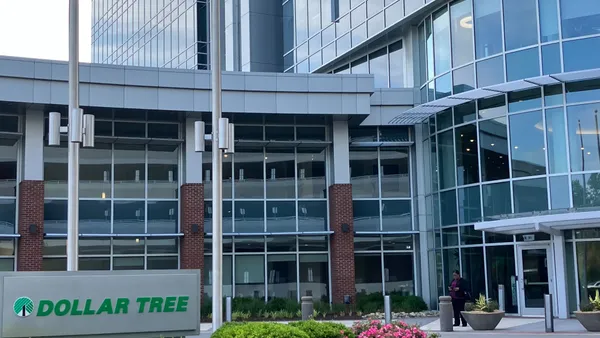Dive Brief:
- With peak season looming, Amazon will restrict warehouse space based on inventory productivity for third-party sellers using Amazon's fulfillment services starting Aug. 16, the company told sellers in a notice Monday.
- Amazon has set a threshold for inventory performance under which sellers' stocks held in Amazon warehouses within the "Fulfilled by Amazon" (FBA) program will be limited. Sellers can improve their inventory productivity score by reducing excess supply and improving sell-through, according to the notice. Amazon will wave inventory removal fees beginning Tuesday, allowing sellers to request their products be returned to them to better meet the new standards. Amazon said the majority of sellers will not be affected by the change, and inventory ceilings that do apply represent approximately three months of stock.
- Amazon will open 33 new fulfillment centers this year, according to the notice. "Even though it’s July, we’re preparing early for the holiday season to meet sustained increased demand, and have already reduced our own Retail product ordering to accommodate more of your products and help you continue to see sales growth," it reads.
Dive Insight:
Peak season 2020 may be tepid in terms of total sales, but e-commerce heavy-hitters need to be prepared for record volume, as coronavirus cases are climbing again and some states are reversing earlier moves to open up their economies. Amazon has already learned this year what such spikes in order volume can do to its industry-leading supply chain.
After restricting incoming inventory to essential products due to capacity constraints in the early weeks of the pandemic in the U.S., Amazon is attempting to avoid a replay with these changes to FBA standards, according to Rick Watson, founder and CEO of RMW Commerce Consulting.
Third-party sellers continue to make up more than half of sales on Amazon. Businesses commenting on official online seller forums balked at the move, warning that it would discourage new product launches and favor very large sellers. Others worried that the standards could create a sticky situation for those relying on ocean freight to on-shore product, as timing can vary greatly and out-of-stocks will affect the inventory productivity measure.
"Amazon is preparing for the 'worst,' which in this case it could be the best holiday season in a generation," Watson told Supply Chain Dive. The company has been on a hiring spree to boost capacity — bringing in more than 175,000 new employees since March. But human capacity can't fix inventory allocation imbalances on a Prime schedule.
"They can only afford to have the top-top-moving products in FBA, hence the limits," said Watson, adding that affected sellers will need to ship product to Amazon warehouses more frequently and in smaller quantities.
The move may also be correcting a pre-pandemic issue, according to e-commerce consultant Jennifer Kaylo Ruscin.
"So many sellers on Amazon tend to use Amazon as their personal warehouse," she told Supply Chain Dive. "I always encourage my clients to have multiple ways of fulfilling orders on Amazon."














